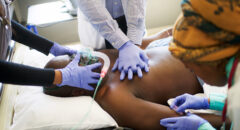
You’re probably used to hearing that your race plays a part in your risk of developing a certain disease. For years, Blacks have been told that they have a higher risk of developing cardiovascular disease due to their race. And while Blacks do have a significantly higher risk (1.6-2.4 times) for cardiovascular disease than white adults, a large new study shows that this is due to social determinants of health, not biological differences.
“The key take-home message is that racial differences in cardiovascular disease are not due to race itself, which is a social concept that is not related to biology,” says corresponding author Dr. Nilay Shah, assistant professor of cardiology and epidemiology at Northwestern University Feinberg School of Medicine and a Northwestern Medicine physician. “Rather, these differences in cardiovascular disease can be explained by differences in social and clinical factors. Clinicians should be evaluating the social determinants that may be influencing the health of their patients.”
The study evaluated data from about 5,100 Black and white adults who participated in the CARDIA (Coronary Artery Risk Development in Young Adults) Study at four locations in the U.S. (Chicago; Minneapolis, Minn.; Oakland, Calif.; and Birmingham, Ala.) and were followed for 30 years.
RELATED: One Bite At A Time! 7 Delicious Foods That Make Your Heart Stronger
Reducing disparities
So, why exactly are so many Blacks dangerously impacted by heart disease? The answer is clinical factors, neighborhood-level factors and socioeconomic factors, according to research. Once these social and clinical risk factors were considered over time, Blacks experienced the same risk as other races, which further highlights the disparities Blacks face.
“This finding is really important to rebut that there is an unexplained or genetic reason that Black individuals have higher risk,” senior author Dr. Sadiya Khan, assistant professor of cardiology and epidemiology at Feinberg and a Northwestern Medicine physician, says.
What can be done to eliminate these disparities?
“Future research needs to go upstream to target social determinants of cardiovascular health. Our study lays groundwork to help inform community-engaged interventions that ensure equal opportunities for all people to have access to high-quality foods, environments and health care,” Khan says.
However, at the core, it sheds light on some actions you can take as a proactive person about your health.
1. Get your blood pressure checked every year
Do you know your numbers? High blood pressure, or hypertension, increases the risk for heart disease and stroke and is highest among Blacks than any other population in the world, according to the American Heart Association. Allowing something such as high blood pressure to go unchecked for too long can be damaging to your heart. You can modify your lifestyle habits to get your blood pressure under control, but you can’t do that if you don’t keep up with your numbers.
Wondering what a healthy range looks like? “We like to see blood pressure numbers in the 120 over 80 range. Anything higher than 130, over 80 is considered high blood pressure,” says Dr. Christopher Irobunda, an interventional cardiologist at New York-Presbyterian/Columbia University Irving Medical Center and the Jim Ovia Associate Professor of Cardiology at Columbia University Vagelos College of Physicians and Surgeons.
RELATED: Heart Disease is No. 1 Killer of Women, Do You Know the Risks Factors?
2. Understand your risk factors
As noted before, Blacks are disproportionately affected by many of the risk factors for heart disease. While some of them are out of your control, the good news is that many can be modified.
“While you can’t control your age, gender, or family history, there are risk factors that can be modified like high blood pressure, obesity, diabetes, high cholesterol, smoking, and a sedentary lifestyle,” Dr. Irobunda adds.
Not sure where to begin? Working with a doctor and a dietitian is a great place to start working on those modifiable risk factors.
3. Know your family history
Sometimes, just talking to our family members can help us a great deal because it can provide us with insight into what we may need to be on the lookout for and help us make the necessary adjustments sooner rather than later.
RELATED: “Exercise is Medicine” Against Heart Failure
4. Eliminate stress
We’ve all been stressed out from time to time, but when it becomes chronic stress, it can be a detriment to our health. Stress can elevate your blood pressure and lead to permanent hypertension or a permanent heart condition. Are you guilty of stress eating, smoking or drinking? All these things can cause weight gain and heart complications. It may be challenging to figure out the best way to eliminate stress from your life, but you can start by making sure you are getting enough sleep and managing your stress in healthy ways (ie, exercise).
5. Know the warning signs
While blood pressure doesn’t usually have any signs or symptoms until it’s too late, you may be able to spot the warning signs of heart disease before it’s too late, depending on the type of heart disease.
With heart failure, you may experience unexplained shortness of breath, difficulty lying down at night without feeling short of breath, and swelling in the legs.
With coronary artery disease (a condition in which the arteries become narrow and constricted) you might have chest pain, chest pressure, or discomfort in the neck or jaw.
6. Adopt healthy habits
“If I could turn back time”. Last, but certainly not least, think about how you can change your DNA.
Dr. Irobunda says you can improve your heart health and reduce your risk of developing heart disease by:
- Take control of your blood pressure.
- Eat a healthy diet that is low in salt and rich in potassium (for example, a plant-based diet that favors fresh fruits and vegetables over highly processed foods).
- Don’t smoke.
- Reduce alcohol intake.
- Exercise regularly for better weight control.
- Understand and manage stress triggers.









